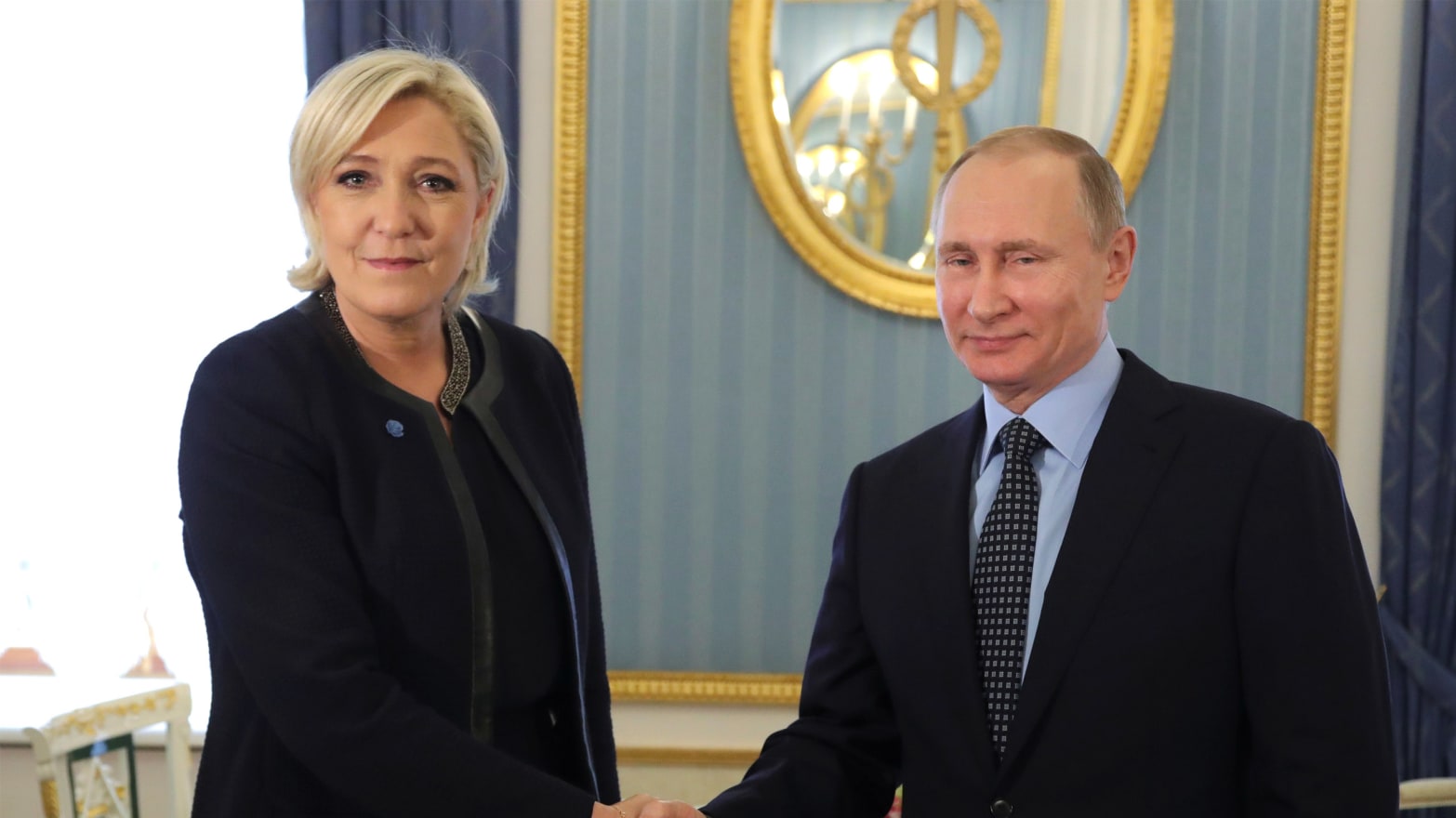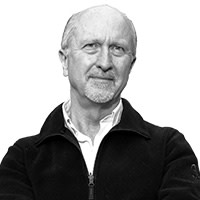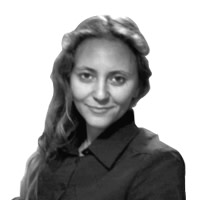MOSCOW — Russian interference in the American elections last year was downright subtle compared to what we’ve seen this week in the run-up to French presidential elections.
The two-round vote on April 23 and May 7 could change politics, defense, and the economy in Europe more radically—and more in Russia’s favor—even than the chaos spawned by Donald Trump’s iffy triumph in the United States.
And on Friday, Putin endorsed his candidate: far-right-wing, anti-European-Union, anti-NATO, anti-immigrant, anti-American, pro-Trump candidate Marine Le Pen.
Of course, Putin said, “We don't want to influence in any way the events going on [in France],” but his government received Le Pen as if she already were settled in as the head of state in Paris.
Olga Bychkova, deputy chief editor of the independent radio station Echo of Moscow, said that the reception accorded Le Pen in Russia was impressive. "She first had meetings with the leaders of the Duma [Russia’s parliament], then she was taken to an exhibit devoted to France at the Kremlin, then she met with Putin. That is a kind of program Moscow organizes for state leaders," Bychkova said.
The French news magazine L’Express was quick to note the anomaly as well, calling it “altogether exceptional” that Putin would receive a presidential candidate so close to an election.
In 2014, when Le Pen’s National Front Party could not secure any loans from French banks, she turned to Russia and received millions of dollars from a now defunct institution there. Putin, at the same time, received endorsement from her party for his takeover of Crimea. She has consistently blamed Washington for starting the new “cold war.” So it was widely assumed that Le Pen was in Moscow Friday as a loyal ally looking for more funding.
We may not learn the outcome of that financial venture for some time. (The original loan and quid pro quo for Crimea was revealed by hackers.)
“Whether she hoped to receive money for her campaign or not, it does not matter, she came to Russia for Putin’s support and she has already received it,” says Bychkova.
The Putin meeting was much more impressive than a loan, in fact. It was the president of Russia placing his bet, if not indeed staking his claim, on the presidency of a country that is a permanent member of the United Nations Security Council, that was a founding member of the European Union, and after decades of estrangement from NATO has become, over the last 10 years, a key member of that alliance once again.
A Le Pen victory would be an orgasmic triumph for Putin, and he seems to think his explicit/implicit endorsement will do her good.
Certainly much of the French political class would seem to give him encouragement in that regard.
At the first major debate on Monday among five leading contenders for the French presidency, three of them found ways to parrot Moscow’s line on critical issues.
Le Pen spoke skeptically of NATO and of a united European defense system, which comes up a lot since the Trump administration has made itself appear so very unfriendly to the traditional North Atlantic Alliance that Russia hates and fears.
Le Pen said she was defending the “freedom of the French” and wouldn’t want “to force our soldiers to go to wars we haven’t decided on.” Ergo, adieu NATO’s core mutual defense clause.
Far-left candidate Jean-Luc Mélenchon, grizzled and tenacious as a badger, was the crowd favorite in the debate even though he’s far behind in the polls. “The world has become again very dangerous,” he said. “I want to be the president of peace. There should be a security conference from the Atlantic to the Urals. It’s the moment to negotiate the borders.”
Nothing could be more musical to Putin’s ears as he’s trying to do that already by using various forms of hybrid warfare on every one of his European frontiers, terrifying even his longtime ally in Belarus, Alexander Lukashenko.
But Mélenchon has no prayer, it would seem, of making it past the first round in the voting on April 23.
The erstwhile favorite to reach the runoff against Le Pen on May 7 was François Fillon, prime minister for five years under former President Nicolas Sarkozy.
He, too, was singing Putin’s song in Monday’s debate, picking up on Mélenchon’s proposal and talking about “a fundamental principle, which is the right of people to determine their own futures.” In context, that would mean the people of Crimea and eastern Ukraine, whose futures are being sucked back into a new Russian empire and who have very little say about it.
It’s not like borders have never been re-drawn in Europe, said Fillon, citing the example of Kosovo, which in fact was freed from the savage Russian-backed government of a genocidal Serbian president in 1999. To address problems in the Middle East, Fillon said, France should work with Russia and Iran. No mention of the U.S.
But Putin wouldn’t bet on Fillon at this point no matter how much their minds meld, because a series of scandals have turned Fillon, once the front-runner, into the third-runner.
Le Canard Enchainé, a satirical and investigative weekly broadsheet that doesn’t publish on the web, revealed a few weeks ago that Fillon—who claims he believes in Thatcherite smaller government, lower taxes, fewer state employees, and fewer protections for private sector employers, and who has called for the eventual elimination of 500,000 public sector jobs—put his wife and two children on the public payroll for jobs they allegedly did not do or were not qualified to do at all. And his family then took home roughly $1 million in public funds.
On Wednesday, after the debates, Le Canard Enchainé reported that Fillon’s consulting firm also was paid $50,000 and promised a percentage of the revenues by a Lebanese pipeline builder for, among other things, arranging a meeting with Vladimir Putin on the sidelines of a conference in St. Petersburg in 2015.
So, cozy as Fillon and Putin may be, and ideologically copacetic as the Russian president and the far-left badger Mélenchon may be, the Kremlin’s bold handicapper decided to go with Le Pen on Friday. She will be by far the most destructive for NATO and the EU. She has looked like a pretty solid front runner in the first round of the French elections. The question at this point is whether she can sustain momentum into round two—and against whom.
For the moment, that person appears likely to be Emmanuel Macron, a boyish looking 39-year-old former Rothschild banker and economy minister who bailed out of the wildly unpopular Socialist government of President François Hollande last year to found a centrist movement called En Marche! that has been drawing support from both the left and the right.
Macron, in the debates last Monday and at every opportunity, has been absolutely firm in his support for the European Union and NATO, and wary of the disruptive, destructive sort of “deconstruction” that U.S. President Donald Trump and his ideologues favor in Europe.
When Le Pen, who tried laughing at Macron to put him down in the debate, said he’d spoken seven minutes while saying nothing, his riposte was short and sharp.
“Unlike you,” Macron told Le Pen, “I don’t want to make a pact with Putin. I want the Europeans.”
The latest IFOP-Fiducial tracking poll on Thursday gave Macron a 1 percent edge on Le Pen in the first round, and a 61.5 to 38.5 margin in the second round among those who intend to vote. But given what we saw with Trump and Brexit last year, there’s no reason for complacency. Many voters are still undecided, many may just stay home. And in the 30+ percent range, the odds are similar to playing Russian roulette with two bullets in your six-shooter.
Can Putin pull the trigger? Already, the Macron campaign has complained of massive hacking attacks.
FBI Director James Comey marveled in his testimony before Congress earlier this week that “the Russians were unusually loud” in their quasi-covert interference with America’s elections, and “it was almost as if they didn’t care if we knew.”
That was nothing to what we’re seeing now with the French elections.
People may joke darkly about Trump as the Putinian candidate. But about Le Pen there is now no doubt at all.
—Anna Nemtsova reported from Moscow and Christopher Dickey reported from Paris. Erin Zaleski also contributed reporting to this story.


